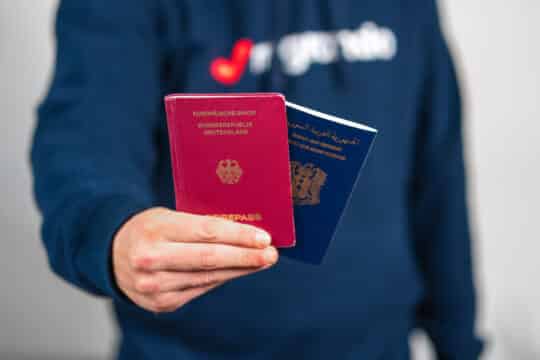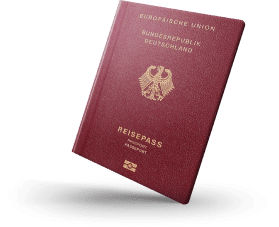Basics of the Tolerance permit
What is Tolerance permit?
In the Federal Republic of Germany, Tolerance permit in accordance with Section 60a AufenthG is the temporary suspension of deportation of persons who are required to leave the country but cannot be deported for legal or factual reasons. This status allows those affected to remain in the country temporarily until the reasons for deportation no longer apply.
It is important to understand that a Tolerance permit is not a Residence permit and therefore does not offer long-term security. The Tolerance permit only allows temporary residence and excludes many social and economic rights that people with a regular Residence permit enjoy.
Where are the differences between Tolerance permit and Residence permit
The differences between a Tolerance permit and a Residence permit are considerable, both legally and in terms of their impact on living conditions in Germany. While an Residence permit offers a regular permit to stay in Germany, an Tolerance permit is merely a temporary measure without the rights and securities associated with a legal Residence permit . Residence permit are: Residence permit, Settlement permit or EU permanent residence permit.
In legal terms, a person with Tolerance permit does not have "regular" status, which means that they are excluded from many social benefits, free access to the labor market and the ability to choose where to live. This often results in a significantly reduced quality of life and fewer opportunities for integration compared to people with a Residence permit.

The path from Tolerance permit to the Residence permit
Obtaining a residence permit in Germany is subject to specific conditions, which may vary depending on the individual situation. The general conditions and special procedures for people with tolerated status are explained below.
Requirements for a regular Residence permit
This section details the general requirements for obtaining a residence permit. The key criteria include:
- Duration of stay: Required minimum duration of stay in Germany, usually based on the specific provisions of the applicable residence law.
- Language skills: Proof of German language skills at B1 level through a recognized language test, as proof of integration and communication skills.
- Work permit: Conditions for obtaining a work permit, including presentation of a valid employment contract.
Residence permit through education and profession
- § 19d AufenthGIncludes the possibility of a residence permit through proof of qualified training. This includes the presentation of the completed training and compliance with certain conditions when applying.
- § 25a or § 25b AufenthGThe granting of a residence permit according to § 25a or 25b AufenthG is based on a long-term stay and proven integration into German society. The main criteria are
- Duration of stay: The required minimum length of stay in Germany.
- Proof of integration: Requirements for proof of social commitment or cultural integration.
Risks associated with special residence routes
- Residence permit according to § 104c AufenthG: The residence permit according to § 104c AufenthG is only valid for a limited period of 18 months. The following applies with regard to subsequent German citizenship: With § 104c AufenthG, it is not possible to apply for Naturalization . It is also important to note that the time spent at Tolerance permit is not counted towards the duration of residence, which can delay obtaining a residence permit.

Practical steps for submitting an application
Specific preparations and steps are required when applying for a Residence permit in accordance with § 25a, § 25b, 19d and § 104c AufenthG. Here you will find a summary to help you collect the necessary documents, understand the process at Foreigners' office and avoid common mistakes.Preparation of the necessary documents
- Proof of identity: Valid passport or other travel document.
- Proof of residence: Documentation of previous residence status (Tolerance permit, permit, residence permit).
- Commitment to the free democratic basic order: Written declaration.
- Proof of German language skills: Certificates or attestations.
- For § 25a AufenthG (young people): Proof of school education, proof of income, proof of age before the age of 27.
- For § 25b AufenthG (tolerated persons): Proof of a six-year stay, economic independence, possibly reduced to four years if there are underage children.
- For Section 104c AufenthG (right of residence with opportunities): Proof of five-year residence on the cut-off date (October 31, 2022), no criminal offenses, special facilitations such as waiver of proof of livelihood and Clarification of identity at the beginning.
- For 19d AufenthG (for qualified tolerated persons): Proof of completion of qualified training or a qualified course of study is required. Alternatively, uninterrupted qualified employment for three years and no receipt of state benefits for living expenses
The procedure for the Foreigners' office
General documents for all paragraphs- Making an appointment: Contact Foreigners' office and make an appointment.
- Document template: Submit all prepared documents at your appointment.
- Application review: The authority reviews your documents and decides on your application.
- Fees: Pay the required fees, which may vary depending on the type of application
Typical errors when applying
- Incomplete documents: Before the appointment, check that all required documents are up to date and complete.
- Deadlines: Pay particular attention to age limits and residence periods, e.g. application before the 27th birthday in the case of § 25a or the five-year residence period up to the cut-off date in the case of § 104c.
- Language barriers: Make sure that you can provide the necessary language certificates in the required quality.
- Lack of knowledge about special regulations: Find out about possible simplifications or special requirements for your specific case, such as the non-application of certain conditions under Section 104c AufenthG.

Legal changes in 2024: new version of Section 10 AufenthG
The amendments to the Residence Act (AufenthG), which came into force on February 27, 2024, relate in particular to Section 10 AufenthG. These amendments have a direct impact on you, especially if you have withdrawn your asylum application as a tolerated foreigner. These changes enable you to switch to a legal Residence permit in accordance with sections 19d, 25a, 25b and 104c AufenthG if you meet the requirements.
The new provisions of Section 10 AufenthG
Here you can see the different points of § 10 AufenthG:
- Paragraph 1: regulates the granting of residence permits before the conclusion of the asylum procedure, whereby important German interests must play a role.
- Paragraph 2: Clarifies that Residence permit, which were issued or extended after your entry, can continue to be extended regardless of whether an asylum application has been submitted.
- Paragraph 3: Focuses on the specific conditions for issuing residence permits to foreigners such as yourself whose asylum applications have been rejected or who have withdrawn their asylum application. In particular, the possibilities for persons who withdrew their asylum applications before March 29, 2023 should be highlighted.
Influence of the changes to the law on toleration holders
With the new regulation from the end of February 2024, as a tolerated person with a withdrawn application for asylum, you are eligible to switch to Residence permit § 19d, 25a, 25b or 104c AufenthG. This gives you a new alternative.These legal adjustments can have a positive impact on your residence prospects:
- Extended access to residence permits: As a tolerated foreigner who has withdrawn their asylum application and fulfills the necessary requirements, you now have improved chances of obtaining a regular Residence permit .
- Improved legal certainty: The clarification that certain conditions have been relaxed or specific deadlines adjusted offers you better planning and security.
- Integration and participation: The opportunity to switch from a Tolerance permit to a Residence permit supports your social and professional integration, which leads to a more stable life situation in the long term.
Possible challenges with the new regulation
- Complexity of the requirements: The specific conditions and deadlines can lead to confusion, particularly with regard to the required length of stay and entry dates.
- Need for information: You need to actively inform yourself and keep up to date with the latest legal developments so that you don't miss any deadlines and can take full advantage of the new opportunities.
- Bureaucratic hurdles: Despite the easing of restrictions, the path to Residence permit can be bureaucratic and time-consuming, requiring thorough preparation and possibly legal support.
Summary and conclusion
The legal framework and options for toleration permit holders in Germany have evolved significantly. Here we summarize the most important points to help you understand and successfully navigate the path to a regular Residence permit .
Summary of the most important points
- Basics of Tolerance permit:
-
- Definition: Tolerance permit in accordance with Section 60a AufenthG is a temporary suspension of deportation of persons obliged to leave the country.
- Restrictions: No long-term security; exclusion from many social and economic rights.
-
Difference to residence permits:
- Legal status: Residence permit offer a regular residence permit in various forms (e.g. residence permit, Settlement permit).
- Rights and securities: In contrast to Tolerance permit , Residence permit includes full social and economic rights and securities.
-
Ways to Residence permit for toleration holders:
- § Section 19d AufenthG: Residence permit through proof of qualified training.
- § 25a and § 25b AufenthG: Residence permit based on many years of residence and proven integration into German society.
-
Legal changes 2024:
- § Section 10 AufenthG new version: Improved conditions for issuing a residence permit to persons who have withdrawn their asylum application or whose asylum application has been rejected.
Call to action - act promptly
To maximize your chances of getting a regular Residence permit , you should consider the following steps:
-
Inform yourself comprehensively: Understand the current changes in the law and how they could affect your situation.
-
Seek professional support: Use the help of specialist lawyers or advice centers to guide you through the complex process of making an application.
-
Document preparation: Collect and organize all necessary documents that prove your long-term presence in Germany, your integration efforts and qualifications.
These proactive steps are crucial to achieving a stable and legally secure residence perspective in Germany. Take advantage of every resource and counseling opportunity to improve your chances of success!
FAQ - The most important questions about Residence permit despite Tolerance permit
To switch from a Tolerance permit to a regular Residence permit in Germany, there are specific routes you can follow. These include:
- § Section 19d AufenthG: Issuance of a residence permit through proof of qualified training.
- § 25a and § 25b AufenthG: These paragraphs enable the acquisition of a residence title on the basis of many years of residence and proven integration into German society.
- § Section 104c AufenthG: Offers the possibility, under certain conditions, of obtaining an opportunity right of residence after five years of tolerated residence.
These paths require that you meet certain criteria such as proof of integration, language skills and, if applicable, a secure livelihood.
In 2024, there will be significant changes to Tolerance permit due to the new version of Section 10 AufenthG. These changes particularly affect people who have withdrawn their asylum application or whose asylum application has been rejected. The new regulations make it easier for these groups to switch to a regular Residence permit residence permit under certain circumstances.
The new rules for Tolerance permit came into force on February 27, 2024. These include changes to Section 10 AufenthG, which create new opportunities for tolerated persons to obtain a Residence permit under certain conditions.
The duration of Tolerance permit in Germany is generally not limited and depends on the individual circumstances of each case. Tolerance permit is granted until the reasons for non-deportation no longer apply. In practice, this can mean that people can be tolerated for several years, especially if there are permanent obstacles to deportation.
After 18 months Tolerance permit , a person's legal situation may change, especially if they fall under specific regulations such as the right to reside under Section 104c of the Residence Act. This right makes it possible, after five years Tolerance permit and under certain conditions, to obtain an 18-month right of opportunity to stay in order to meet the requirements for a regular Residence permit residence permit. At the end of the 18 months, the applicant must be able to prove that they meet the requirements for a regular Residence permit residence permit, otherwise they may revert to the status of Tolerance permit .











